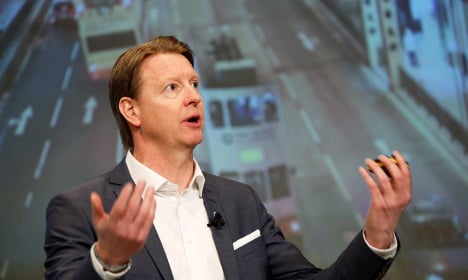BUSINESS
Fired Ericsson boss to get millions in payouts
Swedish telecoms giant Ericsson has fired its long-standing CEO Hans Vestberg, but said he will receive a severance package amounting to millions of kronor.
Published: 25 July 2016 08:46 CEST
Updated: 25 July 2016 14:53 CEST
Updated: 25 July 2016 14:53 CEST

Hans Vestberg of Ericsson. Photo: Christine Olsson/TT
Swedish telecoms giant Ericsson has fired its long-standing CEO Hans Vestberg, the company announced on Monday morning.
Vestberg has been under pressure in recent weeks in the light of a falling share price and lower-than-expected profits. Last week, the company – Sweden's second largest by turnover – announced it was doubling the scope of a major cost-cutting program.
In a statement on Monday, chairman Leif Johansson said that “given the current market environment and the increased tempo of the execution of the company’s strategy, the board has decided that the time is right for a new leader to drive the next phase of Ericsson’s development.”
Johansson said Vestberg had “built strong relationships and partnerships with important customers around the world, and his leadership and energy have been inspiring for both employees and leaders within Ericsson.”
Vestberg, 51, has worked at Ericsson since graduating in 1991. He has been CEO since 2010.
Ericsson’s share price has plunged 23 percent so far this year, while the market as a whole has fallen just three percent. Operating profits for the second quarter were well below market expectations, at 2.8 billion kronor ($327 million).
The company’s deputy CEO Jan Frykhammar has been appointed as interim CEO.
Vestberg is likely to receive a severance package of 28 million kronor, seven million of which will be paid out during his six-month notice period.
“After the notice period he will get 21 million in severance pay, which corresponds to 18 months of salary. If he gets a new job within these 18 months, the payout could be cut to up to 50 percent,” Ericsson press officer Simon Sundberg told the TT newswire.
Url copied to clipboard!


 Please whitelist us to continue reading.
Please whitelist us to continue reading.